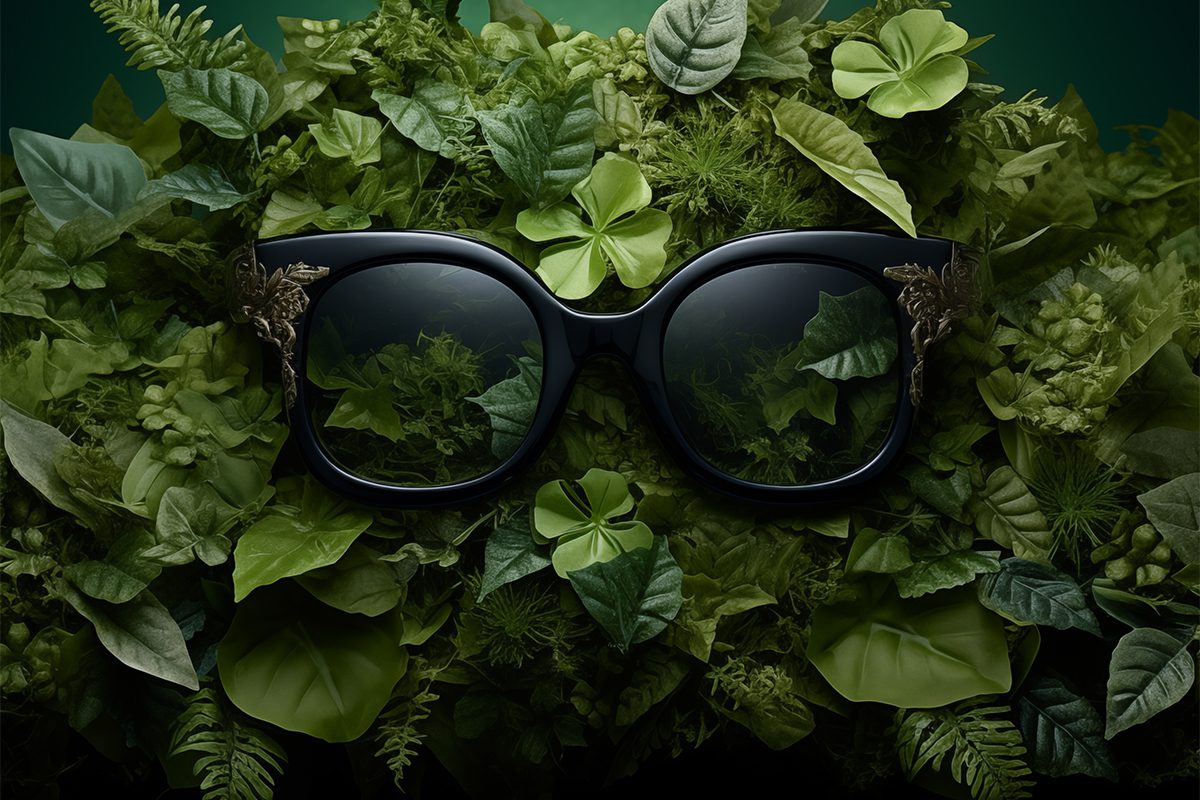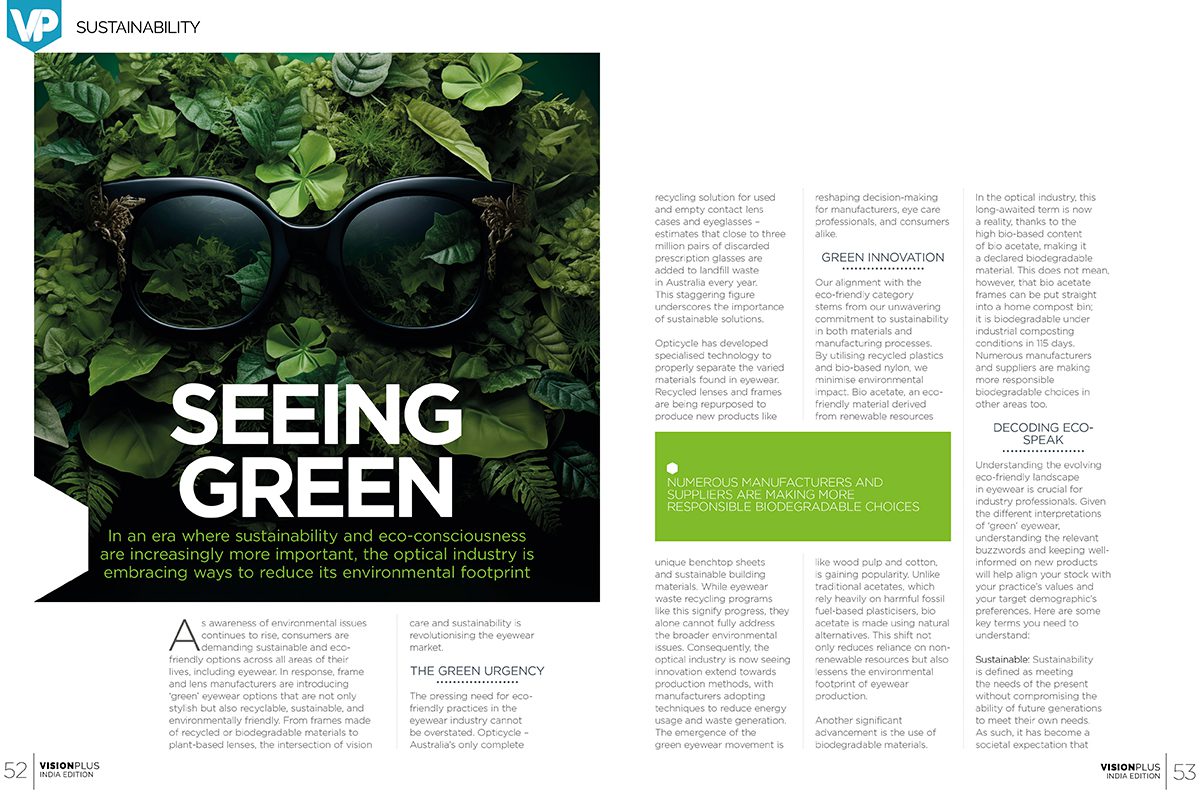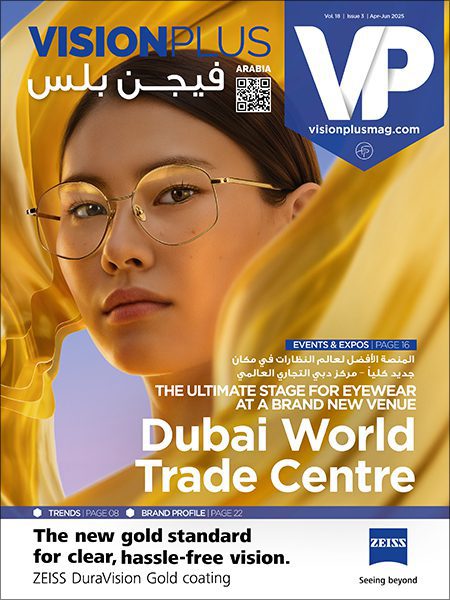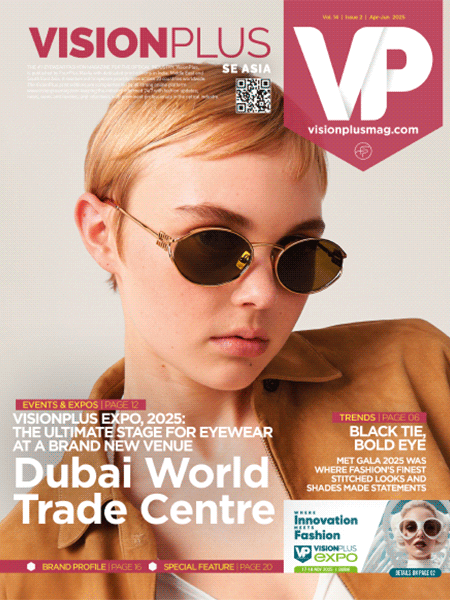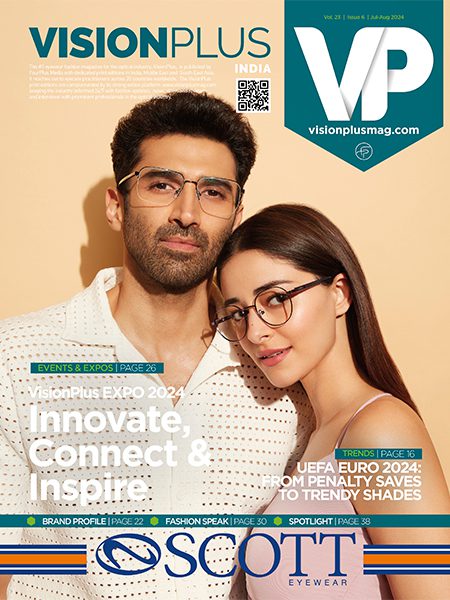
Seeing Green
In an era where sustainability and eco-consciousness are increasingly more important, the optical industry is embracing ways to reduce its environmental footprint
As awareness of environmental issues continues to rise, consumers are demanding sustainable and eco-friendly options across all areas of their lives, including eyewear. In response, frame and lens manufacturers are introducing ‘green’ eyewear options that are not only stylish but also recyclable, sustainable, and environmentally friendly. From frames made of recycled or biodegradable materials to plant-based lenses, the intersection of vision care and sustainability is revolutionising the eyewear market.
The Green Urgency
The pressing need for eco-friendly practices in the eyewear industry cannot be overstated. Opticycle – Australia’s only complete recycling solution for used and empty contact lens cases and eyeglasses – estimates that close to three million pairs of discarded prescription glasses are added to landfill waste in Australia every year. This staggering figure underscores the importance of sustainable solutions.
Opticycle has developed specialised technology to properly separate the varied materials found in eyewear. Recycled lenses and frames are being repurposed to produce new products like unique benchtop sheets and sustainable building materials. While eyewear waste recycling programs like this signify progress, they alone cannot fully address the broader environmental issues. Consequently, the optical industry is now seeing innovation extend towards production methods, with manufacturers adopting techniques to reduce energy usage and waste generation. The emergence of the green eyewear movement is reshaping decision-making for manufacturers, eye care professionals, and consumers alike.
Green Innovation
Our alignment with the eco-friendly category stems from our unwavering commitment to sustainability in both materials and manufacturing processes. By utilising recycled plastics and bio-based nylon, we minimise environmental impact. Bio acetate, an eco-friendly material derived from renewable resources like wood pulp and cotton, is gaining popularity. Unlike traditional acetates, which rely heavily on harmful fossil fuel-based plasticisers, bio acetate is made using natural alternatives. This shift not only reduces reliance on non-renewable resources but also lessens the environmental footprint of eyewear production.
Another significant advancement is the use of biodegradable materials. In the optical industry, this long-awaited term is now a reality, thanks to the high bio-based content of bio acetate, making it a declared biodegradable material. This does not mean, however, that bio acetate frames can be put straight into a home compost bin; it is biodegradable under industrial composting conditions in 115 days. Numerous manufacturers and suppliers are making more responsible biodegradable choices in other areas too.
 Decoding Eco-Speak
Decoding Eco-Speak
Understanding the evolving eco-friendly landscape in eyewear is crucial for industry professionals. Given the different interpretations of ‘green’ eyewear, understanding the relevant buzzwords and keeping well-informed on new products will help align your stock with your practice’s values and your target demographic’s preferences. Here are some key terms you need to understand:
Sustainable: Sustainability is defined as meeting the needs of the present without compromising the ability of future generations to meet their own needs. As such, it has become a societal expectation that companies adopt some form of sustainable policies and actions to protect our future.
Bio Acetate: Bio acetate is an eco-friendly material derived from renewable resources like wood pulp and cotton. Unlike traditional acetates, which rely heavily on harmful fossil fuel-based plasticisers, bio acetate is made using natural alternatives.
Biodegradable: Biodegradability is the ability of a material to be broken down naturally by organisms in an ecosystem. In the optical industry, this long-awaited term is now a reality, thanks to the high bio-based content of bio acetate, making it a declared biodegradable material.
Environmentally / Eco-Friendly: Environmentally friendly or eco-friendly are broad terms that generally mean a company is being more thoughtful towards its environmental impact.
Greenwashing: Consumers are increasingly influenced by green marketing, using sustainability claims in their purchasing decisions, but there is a need to be wary of ‘greenwashing’. To overcome ‘greenwashing,’ it is important to do your research and read the fine print. Do not rely on visuals and packaging alone when it comes to making eco-conscious decisions.
B Corp Certification: B Corps are formally certified businesses that meet high standards of social and environmental performance, accountability, and transparency.
The Role Of Eye Care Professionals
Eye care professionals play a pivotal role in promoting sustainable eyewear. By staying informed about the latest eco-friendly materials and practices, professionals can guide their consumers towards making environmentally responsible choices. This includes educating consumers about the benefits of sustainable eyewear and the importance of proper disposal and recycling of old eyewear.
Moreover, integrating sustainable practices into daily operations can set an example for consumers and other businesses. This might include using energy-efficient lighting and equipment, reducing water usage, and minimising waste through recycling and other eco-friendly practices.
The future of eyewear lies in innovation and sustainability. The intersection of vision care and sustainability is transforming the eyewear market. From recycled and biodegradable materials to energy-efficient production methods, the industry is making significant strides towards reducing its environmental footprint.
The green eyewear movement is gaining momentum, offering a range of sustainable options that meet consumer demands for eco-friendly products. As industry professionals, staying informed and understanding the key terms and certifications can help align your practice with the growing trend towards sustainability. Together, we can ensure that the future of eyewear is not only stylish and functional but also environmentally responsible.

